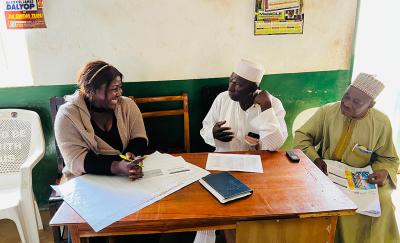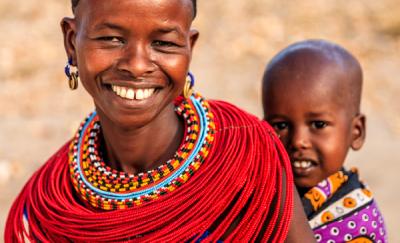Tajikistan: Promoting Health Responsibility by Bicycle


For Khurshed Khojaev, a 48-year-old healthcare worker respectfully called Doctor Khojaev by the community, his bicycle is his vehicle of necessity. It helps him reach the communities he is trying to persuade to take more responsibility for their own health.
Another vehicle he uses to achieve that goal: the Healthy Mother, Healthy Baby (HMHB) activity. “I used to believe that only highly qualified maternal health experts could provide guidance on medical support,” said Khojaev, who works in the Mamurobod village of Jayhun District, Tajikistan. “After attending several Healthy Mother Healthy Baby training sessions, I felt empowered to supervise and raise the awareness of young mothers and caregivers to ensure adequate care and overall wellbeing of mothers and children in my district.”
Khojaev rides his bicycle to his own and a neighboring village to provide health services: timely counseling, referrals to health services, and first aid. Over the years, he has become not just a healthcare worker for the communities, but also a part of their families.
In 2021, Khojaev started to collaborate with the U.S. Agency for International Development’s (USAID) HMHB activity. One of its main objectives is to strengthen the bond between healthcare workers and the community by showing community members how to take better care of their families’ health. In the first year of collaborating with HMHB, Khojaev received training as a facilitator to apply basic methods and skills of community mobilization, collaboration, creative problem solving, and planning skills. Working in villages presents challenges, however: women and children know little about how to maintain their health.
When Khojaev started working with HMHB, he realized that despite his medical background, his efforts as a healthcare worker were limited. He participated on the Community Health Team, a community-level approach to applying knowledge, experience, and social behavior change methods to improve maternal and child health and nutrition. As a result, he began to understand the value of individuals taking responsibility for their own health improvement. Khojaev is convinced that a healthy lifestyle, proper nutrition, and timely medical care are the keys to maintaining health.


On his bicycle, he heads out to change the way his community thinks and behaves about their health. One person he helped was Hanifa Nazarova, who didn’t know why her two-year-old grandson was feeling weak. She was a beneficiary of what Khojaev learned from the HMHB activity. Before his involvement with the activity, he said, he “underestimated the importance of behavior change of parents and families.” But when Nazarova came to him, she recalls, “Dr. Khurshed told me that my child has the symptoms of anemia and should eat healthy and nutritious food.”
“Today, I help raise awareness and knowledge about adequate maternal and child health and nutrition and am convinced that it is even more important than treating illnesses,” said Khojaev. And he is helping others duplicate what he does. Through the activity, Khojaev has taught 67 facilitators in Jayhun district. Now all of them can apply new standards and approaches using global best practices and encourage communities to take ownership for their health.
Read More

Pathways to UHC: Nigeria’s State and Local Approaches to Financing Integrated HIV Services and Primary Health Care
Nigeria’s state and local government-driven approaches to integrated primary health care are transforming financial protection and access for vulnerable populations, setting a replicable model for sustainable universal health coverage.

Diabetes, Hypertension, Antenatal Care Among Bangladesh Women
Bangladesh needs to increase the frequency and quality of antenatal care to improve awareness of hypertension and diabetes among child-bearing women.

Beyond Borders and Building Blocks: The Future of Health Systems Strengthening
Explore the Health for All movement and the power of primary care to transform the future health systems in this mini-Master Class with Kelly Saldana.

Global Health – February 2024
Dive into our latest global health newsletter today: new funding in the DRC, local power shifts in Peru, why we need One Health, and more!